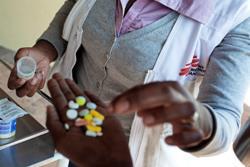Girl, 7, battles MDR-TB

Lindokunhle’s mother, Nombulelo Likhuleni, remembers when her daughter first fell sick in September 2010.
“My daughter started losing weight and her temperature was high so I took her to the clinic,” said Likhuleni, who lives in Msogwaba about 20 kms outside Nelspruit. “Her sputum was taken to the laboratory to be tested and she was diagnosed with pulmonary TB.”
MDR-TB is resistant to two of the most commonly used anti-TB drugs, isoniazid and rifampicin.
 MDR-TB can be transmitted from one person to another but it can also develop when patients can’t complete TB treatment.
MDR-TB can be transmitted from one person to another but it can also develop when patients can’t complete TB treatment.
Likhuleni admits she didn’t make sure Lindokunhle took every dose of her original TB treatment but says she never understood the importance of ensuring her daughter adhered to the daily treatment.
Now she fears that missed doses have caused her daughter to develop a form of TB that kills about 40 percent of all patients diagnosed with it:
“I didn’t understand a thing when I was educated about TB and its treatment. During that time I was working and had to leave Lindokunhle with my sister. There were days that she was not given treatment. I didn’t know skipping days without drinking her treatment would be a problem.
“Even when my daughter told me she hadn’t taken her medicines, I didn’t think it was dangerous to her health. She completed her treatment and I was happy. I didn’t know the TB would come back stronger than before,” Likhuleni told OurHealth.
MDR-TB treatment lasts about two years and involves up to 20 pills a day and months of painful, daily injections. South Africa diagnosis 7,500 cases of MDR-TB annually, according to the Department of Health.
Nurses at the local Msogwaba clinic stressed that adhering to TB treatment is important and so is making sure that patients understand that.
“Sometimes while we’re educating patients with TB or their family member, if you ask if they understand they would give you a big ‘yes’ and go,” said one nurse who asked not to be named. “At their next visit to a professional you will start noticing that the are no changes to their health.”
“People need to understand that it’s very important to adhere to and complete their treatment as instructed by the health profession,” she added. “If it happens that TB returns, this time is when Directly Observed Treatment Support (DOTS) must begin.”
Introduced by the World Health Organisation, DOTS requires that community health workers – or DOTS supporters – are present when patients take their treatment every day.
Fikile Mkhonto is a DOTS supporter. He said that some patients may not adhere to treatment because they lack transport money to collect their treatment at clinics or struggle to cope with hash side effects from MDR-TB treatment. MDR-TB treatment can cause nausea, vomiting and even permanent hearing loss.
Author
Republish this article
This work is licensed under a Creative Commons Attribution-NoDerivatives 4.0 International License.
Unless otherwise noted, you can republish our articles for free under a Creative Commons license. Here’s what you need to know:
You have to credit Health-e News. In the byline, we prefer “Author Name, Publication.” At the top of the text of your story, include a line that reads: “This story was originally published by Health-e News.” You must link the word “Health-e News” to the original URL of the story.
You must include all of the links from our story, including our newsletter sign up link.
If you use canonical metadata, please use the Health-e News URL. For more information about canonical metadata, click here.
You can’t edit our material, except to reflect relative changes in time, location and editorial style. (For example, “yesterday” can be changed to “last week”)
You have no rights to sell, license, syndicate, or otherwise represent yourself as the authorized owner of our material to any third parties. This means that you cannot actively publish or submit our work for syndication to third party platforms or apps like Apple News or Google News. Health-e News understands that publishers cannot fully control when certain third parties automatically summarise or crawl content from publishers’ own sites.
You can’t republish our material wholesale, or automatically; you need to select stories to be republished individually.
If you share republished stories on social media, we’d appreciate being tagged in your posts. You can find us on Twitter @HealthENews, Instagram @healthenews, and Facebook Health-e News Service.
You can grab HTML code for our stories easily. Click on the Creative Commons logo on our stories. You’ll find it with the other share buttons.
If you have any other questions, contact info@health-e.org.za.
Girl, 7, battles MDR-TB
by cynthiamaseko, Health-e News
October 4, 2013



